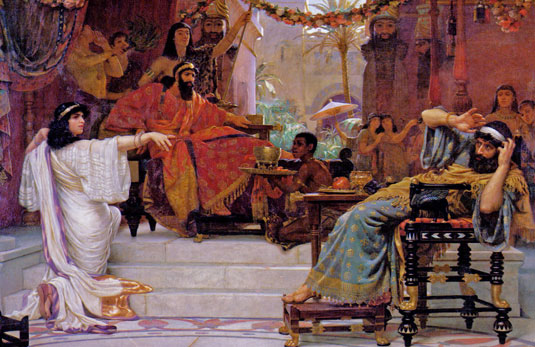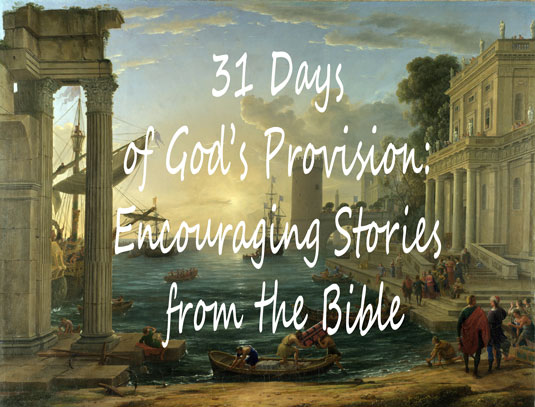 After the Jews had been held captive for many years in Babylon, the area is conquered by the Medes and the Persians. Under the Persian king Cyrus, the Jews are given the opportunity to return to Jerusalem. Only a fraction of the Israelite population takes advantage of the offer. Ezra and Nehemiah give accounts of those who do return, but most choose the prosperity and luxury of Persia, and remain behind. Dr. J. Vernon McGee states that “While these Jews are out of the will of God, they are not beyond the care of God, and so the book of Esther is about the providence of God.”
After the Jews had been held captive for many years in Babylon, the area is conquered by the Medes and the Persians. Under the Persian king Cyrus, the Jews are given the opportunity to return to Jerusalem. Only a fraction of the Israelite population takes advantage of the offer. Ezra and Nehemiah give accounts of those who do return, but most choose the prosperity and luxury of Persia, and remain behind. Dr. J. Vernon McGee states that “While these Jews are out of the will of God, they are not beyond the care of God, and so the book of Esther is about the providence of God.”
When our story opens, King Xerxes (also known as Ahasuerus), is ruler over 127 provinces from India to the upper part of the Nile River. Reigning from his royal throne in the citadel of Susa, the king is hosting a banquet for his nobles, military leaders and government officials. In a great display of wealth and power, the food is sumptuous and the wine is abundant. The king is in high spirits and heartily partakes of the wine he is serving to his guests. In short order, Xerxes becomes a bit inebriated and, as people often do when they are drunk, begins to say some things that he will later come to regret. For starters, he orders his wife, the queen, to visit the all-male gathering so that he can show her off to his friends. Such an act would demean her character, and so she refuses. Well, now the king is in an awkward predicament. Angry and embarrassed by the fact that his queen has disobeyed him in front of his nobles, Xerxes now has to punish her for her refusal. He is egged on by his advisors who stress that the queen’s actions would set a bad precedence for all other wives in the kingdom, and heaven forbid, encourage them to think for themselves. Under the advice of his cabinet, Xerxes agrees to set aside the queen as an example, to prevent other wives from assuming too much liberty.
Xerxes goes off to war with the Greeks, is soundly defeated, and returns home dejected. As he wanders around his palace feeling sorry for himself, he misses the queen, but since the law cannot be broken by even the king, he has to live with the consequences of his rash decision. The servants recognize that Xerxes is lonely, so they organize an event that is sure to lift his spirits.
Then the king’s personal attendants proposed, “Let a search be made for beautiful young virgins for the king. Let the king appoint commissioners in every province of his realm to bring all these beautiful young women into the harem at the citadel of Susa. Let them be placed under the care of Hegai, the king’s eunuch, who is in charge of the women; and let beauty treatments be given to them. Then let the young woman who pleases the king be queen instead of Vashti.” This advice appealed to the king, and he followed it. Esther 2:2-4, NIV
So now the search is on, and young ladies are rounded up all throughout the kingdom. This is where Esther comes into the picture. She is a young Jewess, living as a ward of her older cousin.
Now there was in the citadel of Susa a Jew of the tribe of Benjamin, named Mordecai son of Jair, the son of Shimei, the son of Kish, who had been carried into exile from Jerusalem by Nebuchadnezzar king of Babylon, among those taken captive with Jehoiachin king of Judah. Mordecai had a cousin named Hadassah, whom he had brought up because she had neither father nor mother. This young woman, who was also known as Esther, had a lovely figure and was beautiful. Mordecai had taken her as his own daughter when her father and mother died. Esther 2:5-7, NIV
Esther is one of the young ladies who are drafted into this Persian beauty pageant. While the goal of the king is to select a new queen, the reality of the situation is that all of the “contestants” will be added to the king’s harem. The Bible doesn’t say if Esther was coerced into participating or if she went willingly. It does say however, that her cousin Mordecai advised her to keep her heritage a secret, which she does. After many months of beauty treatments, Esther is called to the king. He is delighted beyond measure and declares Esther his new queen.
With Esther now installed in the palace, her cousin communicates with her by messenger, as her identity is still a secret. While the king is fairly indifferent to the Jews, others in his administration are not. Haman in particular really despises the Jews. After having a run-in with Mordecai who refused to bow to him, Haman plots for ways to take revenge, not just on Mordecai, but on all the Jews in the land. Finally Haman comes up with a fool-proof plan.
Then Haman said to King Xerxes, “There is a certain people dispersed among the peoples in all the provinces of your kingdom who keep themselves separate. Their customs are different from those of all other people, and they do not obey the king’s laws; it is not in the king’s best interest to tolerate them. If it pleases the king, let a decree be issued to destroy them, and I will give ten thousand talents of silver to the king’s administrators for the royal treasury.” So the king took his signet ring from his finger and gave it to Haman son of Hammedatha, the Agagite, the enemy of the Jews. “Keep the money,” the king said to Haman, “and do with the people as you please.” Esther 3:8-11, NIV
The decree gave the Persians permission to kill their neighboring Jews and seize their property. Haman is as pleased as punch, and in his confidence, he builds a gallows in his yard, with which to hang Mordecai on when the time comes.
Mordecai sends word to Esther requesting that she intervene with the king on behalf of her people. This is risky for her as she is not permitted to go to the king unless he summons her. If she does initiate a meeting with him, he can choose to accept her visit or he can choose to have her executed. Mordecai reminds her about the providence of God that may have been instrumental in placing Esther into her current role as queen.
When Esther’s words were reported to Mordecai, he sent back this answer: “Do not think that because you are in the king’s house you alone of all the Jews will escape. For if you remain silent at this time, relief and deliverance for the Jews will arise from another place, but you and your father’s family will perish. And who knows but that you have come to your royal position for such a time as this?” Then Esther sent this reply to Mordecai: “Go, gather together all the Jews who are in Susa, and fast for me. Do not eat or drink for three days, night or day. I and my attendants will fast as you do. When this is done, I will go to the king, even though it is against the law. And if I perish, I perish.” Esther 4:12-16, NIV
Esther pays an unexpected visit to King Xerxes. To her relief, he extends the royal scepter, welcoming her into his presence. Delighted to see her again, Xerxes tells her that he will grant whatever she’d like, even if it is up to half his kingdom. Knowing that the king’s decree cannot be reversed, she doesn’t address the issue at hand, but invites both the king and Haman to a banquet. They whole-heartedly accept, and while there, she invites them to a second banquet. After dinner on the second night, she musters up her courage, and lays all her cards out on the table.
So the king and Haman went to Queen Esther’s banquet, and as they were drinking wine on the second day, the king again asked, “Queen Esther, what is your petition? It will be given you. What is your request? Even up to half the kingdom, it will be granted.” Then Queen Esther answered, “If I have found favor with you, Your Majesty, and if it pleases you, grant me my life—this is my petition. And spare my people—this is my request. For I and my people have been sold to be destroyed, killed and annihilated. If we had merely been sold as male and female slaves, I would have kept quiet, because no such distress would justify disturbing the king.” King Xerxes asked Queen Esther, “Who is he? Where is he—the man who has dared to do such a thing?” Esther said, “An adversary and enemy! This vile Haman!” Esther 7:1-6, NIV
Suffice it to say, Mr. Haman is not given leave to stay for dessert. As the king cannot nullify his first decree, he issues a second, giving the Jews permission to defend themselves on the day scheduled for their annihilation. With God’s help, they of course prevail and to this day celebrate the Feast of Purim, which commemorates this national triumph over their enemies.
Esther’s story was one of destruction, but God’s provision was one of deliverance.
Join me tomorrow for a story involving a false accusation, a famous coat check, and a provision of peace!
 If you’ve missed any part of this series, you can find all of the posts in the side bar category 31 Days of God’s Provision.
If you’ve missed any part of this series, you can find all of the posts in the side bar category 31 Days of God’s Provision.
On the journey toward Home,












{ 1 trackback }